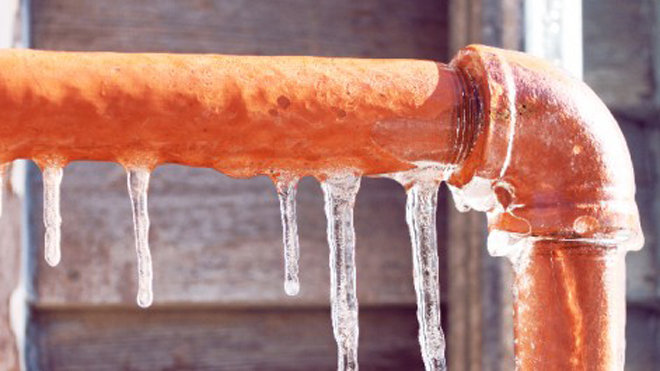This post down the page involving How to prepare your home plumbing for winter weather is highly compelling. Check it out for your own benefit and decide what you think of it.

Winter can wreak havoc on your pipes, especially by freezing pipelines. Right here's just how to avoid it from taking place and what to do if it does.
Intro
As temperatures decline, the threat of frozen pipelines rises, potentially causing costly fixings and water damages. Understanding how to prevent icy pipes is essential for property owners in cold climates.
Avoidance Tips
Shielding at risk pipelines
Cover pipelines in insulation sleeves or make use of warmth tape to safeguard them from freezing temperature levels. Concentrate on pipelines in unheated or external areas of the home.
Heating techniques
Keep interior rooms effectively warmed, specifically areas with pipes. Open cabinet doors to allow cozy air to circulate around pipelines under sinks.
How to recognize icy pipes
Try to find lowered water flow from taps, uncommon smells or noises from pipelines, and noticeable frost on subjected pipes.
Long-Term Solutions
Structural modifications
Consider rerouting pipes away from outside wall surfaces or unheated areas. Add additional insulation to attic rooms, cellars, and crawl spaces.
Upgrading insulation
Purchase high-quality insulation for pipes, attics, and wall surfaces. Appropriate insulation aids preserve constant temperatures and reduces the risk of frozen pipes.
Shielding Outdoor Plumbing
Garden hoses and outside taps
Detach and drain yard hoses before wintertime. Set up frost-proof faucets or cover outdoor faucets with shielded caps.
Comprehending Frozen Pipelines
What causes pipelines to freeze?
Pipelines ice up when subjected to temperatures listed below 32 ° F (0 ° C) for extended durations. As water inside the pipes freezes, it broadens, putting pressure on the pipeline walls and possibly creating them to rupture.
Dangers and problems
Frozen pipes can result in supply of water disturbances, building damage, and expensive repair services. Ruptured pipelines can flooding homes and create considerable architectural damages.
Indicators of Frozen Pipes
Identifying frozen pipes early can stop them from breaking.
What to Do If Your Pipes Freeze
Immediate actions to take
If you suspect icy pipelines, keep faucets open up to soothe pressure as the ice thaws. Utilize a hairdryer or towels taken in hot water to thaw pipelines slowly.
Final thought
Stopping frozen pipes calls for proactive steps and quick feedbacks. By recognizing the causes, signs, and preventive measures, homeowners can protect their pipes throughout cold weather.
Helpful Tips to Prevent Frozen Pipes this Winter
UNDERSTANDING THE BASICS: WHY PIPES FREEZE AND WHY IT’S A PROBLEM
Water freezing inside pipes is common during the winter months, but understanding why pipes freeze, and the potential problems it can cause is crucial in preventing such incidents. This section will delve into the basics of why pipes freeze and the associated problems that may arise.
THE SCIENCE BEHIND FROZEN PIPES
When water reaches freezing temperatures, it undergoes a physical transformation and solidifies into ice. This expansion of water as it freezes is the primary reason pipes can burst. As the water inside the pipe freezes, it expands, creating immense pressure on the walls. If the pressure becomes too great, the pipe can crack or rupture, leading to leaks and water damage.
FACTORS THAT CONTRIBUTE TO PIPE FREEZING
Low Temperatures: Extremely cold weather, especially below freezing, increases the risk of pipes freezing. Uninsulated or Poorly Insulated Pipes: Pipes located in unheated areas, such as basements, crawl spaces, or attics, are more prone to freezing. Insufficient insulation or lack of insulation altogether exacerbates the problem. Exterior Wall Exposure: Pipes running along exterior walls are susceptible to freezing as they encounter colder temperatures outside. Lack of Heating or Temperature Regulation: Inadequate heating or inconsistent temperature control in your home can contribute to frozen pipes. PROBLEMS CAUSED BY FROZEN PIPES
- Pipe Bursting: As mentioned earlier, the expansion of water as it freezes can cause pipes to burst, resulting in significant water damage.
- Water Damage: When pipes burst, it can lead to flooding and water damage to your property, including walls, ceilings, flooring, and personal belongings.
- Structural Damage: Prolonged exposure to water from burst pipes can compromise the structural integrity of your home, leading to costly repairs.
- Mold and Mildew Growth: Excess moisture from water damage can create a favorable environment for mold and mildew growth, posing health risks to occupants.
- Disrupted Water Supply: Frozen pipes can also result in a complete or partial loss of water supply until the issue is resolved.
WHY CERTAIN PIPES ARE MORE PRONE TO FREEZING
- Location: Pipes located in unheated or poorly insulated areas, such as basements, crawl spaces, attics, or exterior walls, are at higher risk of freezing.
- Exterior Pipes: Outdoor pipes, such as those used for irrigation or exposed plumbing, are particularly vulnerable to freezing as they are directly exposed to the elements.
- Supply Lines: Pipes that carry water from the main water supply into your home, including the main water line, are critical to protect as freezing in these lines can affect your entire plumbing system.
- Underground Pipes: Pipes buried underground, such as those connected to sprinkler systems or outdoor faucets, can be susceptible to freezing if not properly insulated.
https://busybusy.com/blog/helpful-tips-to-prevent-frozen-pipes-this-winter/

I'm certainly very fascinated with How To Avoid Freezing Pipes and I really hope you enjoyed reading the piece. In case you liked our article please do not forget to pass it around. I appreciate your readership.
Book Maintenance